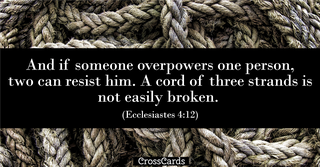- Recent Translations
- All Translations
Ecclesiastes 4:3
Share
Settings
Ecclesiastes 4:3 in Other Translations
Ecclesiastes 4:3 Meaning and Commentary
Yea, better [is he] than both they which hath not yet been,
&c.] That is, an unborn person; who is preferred both to the dead that have seen oppression, and to the living that are under it; see ( Job 3:10-16 ) ( Job 10:18 Job 10:19 ) . This supposes a person to be that never was, a mere nonentity; and the judgment made is according to sense, and regards the dead purely as such, and so as free from evils and sorrows, without any respect to their future state and condition; for otherwise an unborn person is not happier than the dead that die in Christ, and live with him: and it can only be true of those that perish, of whom indeed it might be said, that it would have been better for them if they had never been born, according to those words of Christ, ( Matthew 26:24 ) ; and is opposed to the maxim of some philosophers, that a miserable being is better than none at all. The Jews, from this passage, endeavour to prove the pre-existence of human souls, and suppose that such an one is here meant, which, though created, was not yet sent into this world in a body, and so had never seen evil and sorrow; and this way some Christian writers have gone. It has been interpreted also of the Messiah, who in Solomon's time had not yet been a man, and never known sorrow, which he was to do, and has, and so more happy than the dead or living. But these are senses that will not bear; the first is best; and the design is to show the great unhappiness of mortals, that even a nonentity is preferred to them; who hath not seen the evil work that is done under the sun?
the evil works of oppressors, and the sorrows of the oppressed.
